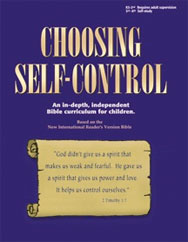Kaye Freeman has written a series of Bible study courses for children in kindergarten through high school. All courses are designed for students to grow in their relationship with God as well as in their knowledge of the Bible.
Seven courses target younger students, but even these courses are suitable for different age ranges within the elementary grades. For example, all elementary studies can be used for kindergarten through second grade if used with adult assistance. An adult guide can read the text and passages while the younger students color in the illustrations. Students in grades three through five can use these same courses for independent study. Titles include:
- Choosing Kindness
- Choosing Humility
- Choosing Responsibility
- Choosing Thankfulness
- Choosing Self-control
- Choosing Obedience
- Choosing Righteousness
Each course addresses a character trait with a topical study that draws on scattered scripture verses as well as illustrative Bible stories for lesson material. Students look up scriptures and complete a variety of activities as they work through each lesson. They might fill in blanks, answer multiple-choice questions, write full-sentence answers, match up columns, and solve various types of puzzles (e.g., mazes and codes.) They memorize and write a weekly memory verse. There are a number of pages that might be used as coloring pages. Lessons include practical applications, and they often make connections from previous lessons to tie ideas together. Quizzes and answer keys are at the back of each book.
Each course has 16 lessons and should be completed in about one month. Some lessons will take more time than others. It might be possible to complete some lessons in one sitting, while others should be spread out over a few days.
Five more courses designed for pre-teens and teens are more like survey courses. Three of these courses have 16 lessons each:
- Jesus in the Old Testament
- Bible Covenants
- Godly Relationships
Another course for pre-teens and teens has 32 lessons:
- A Journey through the Old Testament, the Gospels, and Acts
While the first three upper-level courses have four quizzes each, there are 12 quizzes for the last course. The last course can easily be spread out over a full school year if students take time to read through many of the books of the Bible they are studying, even if it's not required.
While courses are not written on an adult level, they are challenging with very worthwhile content. At the upper level, there are no more puzzles or coloring pages. Students still fill in blanks and answer multiple-choice questions, but sometimes they write a sentence or a paragraph in response to a question. As with the younger-level books, some lessons might be completed in one sitting, while others will take more time. For all of these upper-level courses, the author suggests that parents work with pre-teens while teens should be able to work independently.
While the author comes from a Full Gospel perspective and believes that the gifts of the Holy Spirit (such as miracles and speaking in tongues) are still active today, she tells me that only Choosing Thankfulness advocates speaking in tongues. This is the only distinction that might narrow the audience for theological reasons. Lower-level courses are based on the New International Reader’s Version Bible, while upper-level courses use the New International Version.
Most homeschool Bible study resources that focus strongly on character traits have been designed for family or group use rather than independent study. I think that allowing students to independently work through the courses on character traits as well as the upper-level course on Godly Relationships might be much more productive than a family study since these courses challenge students to seriously consider their own behavior and attitudes—something that can be awkward in groups. While young children up through about second grade will generally do well working on character traits in a family or group setting, beyond that I would generally recommend independent study. So rather than push students in grades five and six into the upper-level courses, I’d stick with the lower-level courses. Seventh graders should be able to work independently through the upper-level courses.









